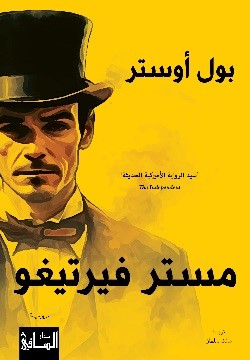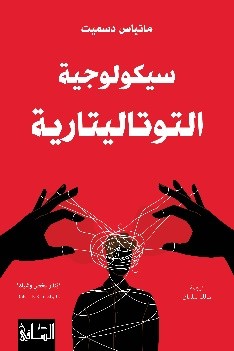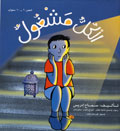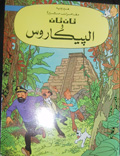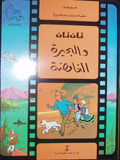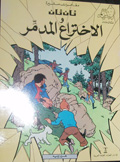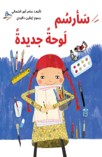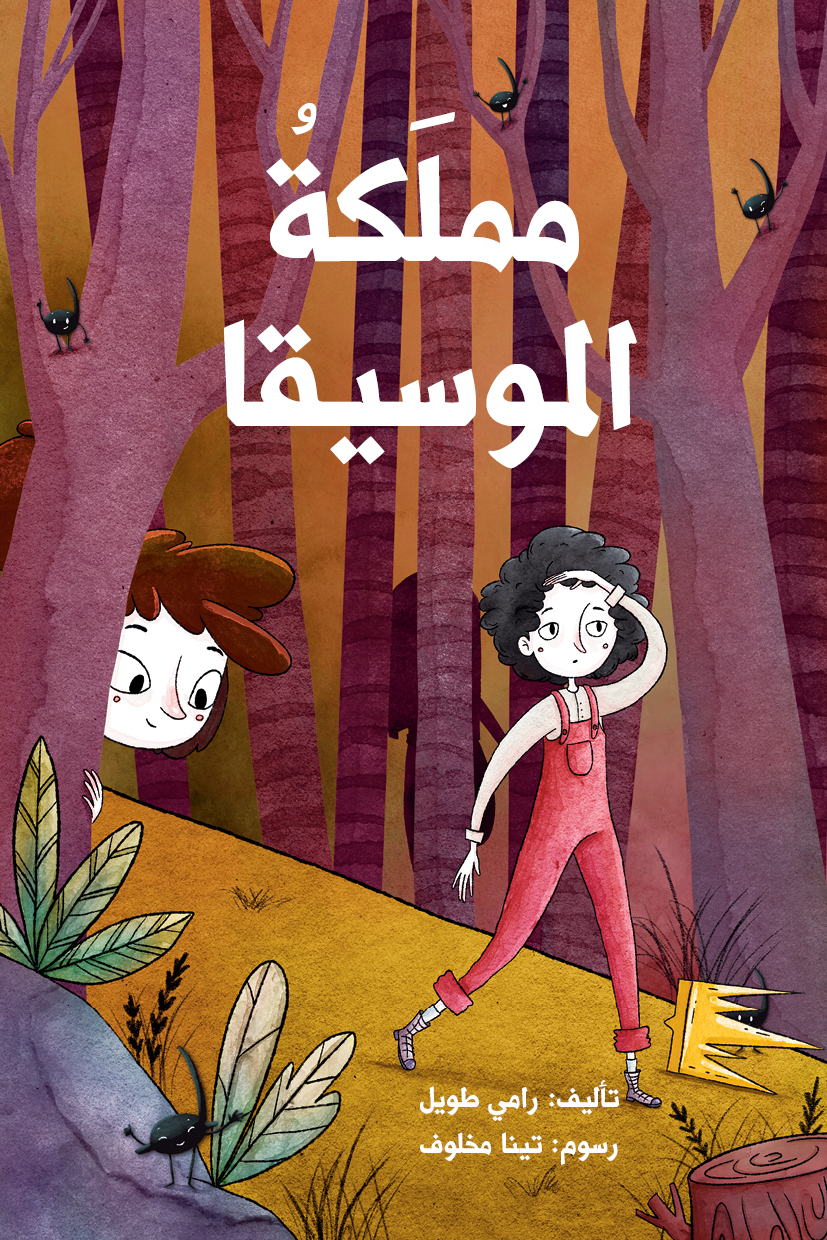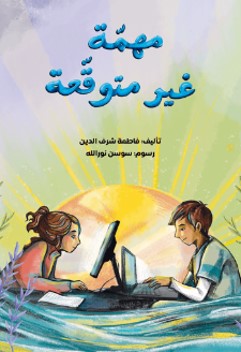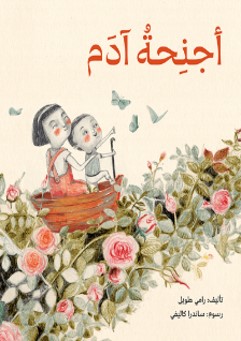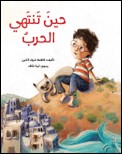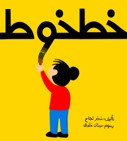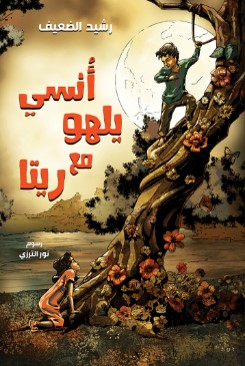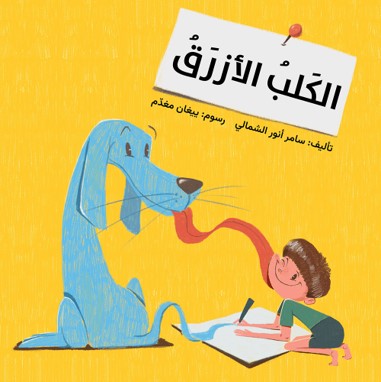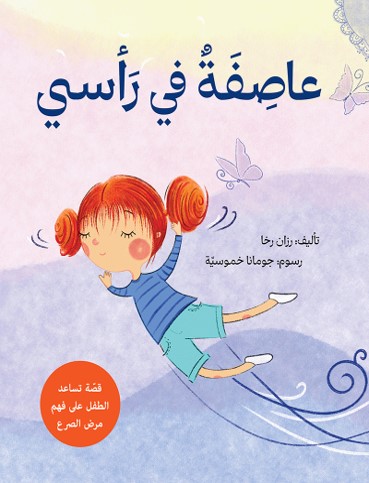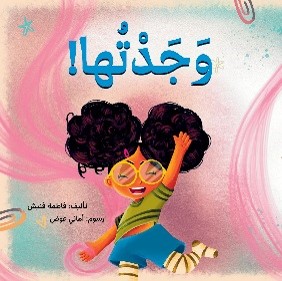Mistir Fīrtīghū: Arabic 2024
مستر فيرتيغو
14.90 £
Share
Wishlist
Original Title:
Mr. Vertigo
ISBN:
9786140323100
Translator:
Mālik Salmān
Publisher:
Dar Al-Saqi
Age Group:
Adult
Pages:
352
Weight:
390 g
Dimensions:
14 x 21 x 3.2 cm
Book Cover:
Paperback
Today
بركات العالق في الخيال romanization
The romanization of بركات العالق في الخيال (a novel by Abdulaziz Saqabi) can be rendered as Barakāt al-‘Āliq fī al-Khayāl using a standard Arabic romanization system. This follows conventions where:
بركات (Barakāt) means "blessings."
العالق (al-‘Āliq) means "the stuck" or "the suspended."
في (fī) means "in."
الخيال (al-Khayāl) means "imagination" or "fantasy."
Would you like a breakdown of different romanization systems for Arabic? I know you enjoy exploring linguistic accessibility!
عبد العزيز الصقعبي romanization
The name عبد العزيز الصقعبي can be romanized as ‘Abd al-‘Azīz al-Ṣuq‘abī using a standard Arabic romanization system. Here's a breakdown:
عبد العزيز → ‘Abd al-‘Azīz (meaning "Servant of the Almighty")
الصقعبي → al-Ṣuq‘abī (a surname with specific regional significance)
This follows conventions where ‘Abd retains the Arabic apostrophe for the ‘Ayn sound, and Ṣuq‘abī preserves the emphatic Ṣād and the glottal ‘Ayn.
Would you like a comparison across different romanization systems? I know you enjoy exploring linguistic precision!
بركات العالق في الخيال dewey
I couldn't find the exact Dewey Decimal Classification (DDC) for بركات العالق في الخيال, but based on its themes—fiction, identity, and contemporary social dynamics—it would likely fall under 892.736, which covers modern Arabic fiction.
If you'd like, I can help refine the classification further based on specific aspects of the novel. Let me know how deep you want to go!
عمّة آل مشرق romanization
The romanization of عمّة آل مشرق (a novel by Umayma al-Khamīs) can be rendered as ‘Ammat Āl Mashriq using a standard Arabic romanization system. Here's a breakdown:
عمّة → ‘Ammat (meaning "paternal aunt")
آل → Āl (meaning "family" or "house of")
مشرق → Mashriq (meaning "east" or "orient")
This follows conventions where ‘Ammat retains the Arabic apostrophe for the ‘Ayn sound, and Āl Mashriq preserves the long Ā vowel.
Would you like a comparison across different romanization systems? I know you enjoy exploring linguistic precision!
أميمة الخميس romanization
The name أميمة الخميس can be romanized as Umaymah al-Khamīs. This follows standard conventions where:
أميمة → Umaymah (a common Arabic feminine name)
الخميس → al-Khamīs (meaning "Thursday," often used as a surname)
Would you like a comparison across different romanization systems? I know you enjoy exploring linguistic precision!
Edit in a page
الأسود romaznization
The word الأسود can be romanized as al-Aswad, following standard Arabic romanization conventions. Here's a breakdown:
ال → al- (the definite article)
أسود → Aswad (meaning "black")
If you're interested in different romanization systems, you might find this Wikipedia article useful. Let me know if you'd like a comparison across various systems!
black a book by alain Bediou
It looks like you're referring to Black: The Brilliance of a Non-Color by Alain Badiou (not "Bediou"). This book explores the philosophical and cultural significance of the color black, touching on themes of art, politics, metaphysics, and personal memory. Badiou reflects on how black can obscure and reveal, making it more luminous than ever.
Would you like a deeper analysis of its themes or a comparison with other works by Badiou? I know you enjoy structured knowledge and philosophical inquiry!
Edit in a page
Black: The Brilliance of a Non-Color dewey
I couldn't find the exact Dewey Decimal Classification (DDC) for Black: The Brilliance of a Non-Color by Alain Badiou, but based on its themes—philosophy, aesthetics, and cultural analysis—it would likely fall under 111.85, which covers philosophy of color.
If you'd like, I can help refine the classification further based on specific aspects of the book. Let me know how deep you want to go!
الجندي الطيب شفيك romanization
The Arabic title الجندي الطيب شفيك can be romanized as al-Jundī al-Ṭayyib Švayk. This follows standard conventions:
الجندي → al-Jundī (meaning "the soldier")
الطيب → al-Ṭayyib (meaning "the good" or "the kind")
شفيك → Švayk (the transliteration of the Czech name Švejk)
This novel, originally written in Czech by Jaroslav Hašek, is widely known as The Good Soldier Švejk. Would you like a comparison across different romanization systems? I know you enjoy exploring linguistic precision!
1ar.wikipedia.org
الجندي الطيّب شفيك in english
The Arabic title الجندي الطيّب شفيك translates to The Good Soldier Švejk in English. This is a satirical novel by Jaroslav Hašek, originally written in Czech as Osudy dobrého vojáka Švejka za světové války ("The Fateful Adventures of the Good Soldier Švejk During the World War").
The novel humorously critiques bureaucracy and military absurdity during World War I, following the misadventures of Švejk, a seemingly foolish yet cunning soldier who navigates the chaos of war with irony and wit.
Would you like a deeper dive into its themes or a comparison with other satirical works? I know you enjoy structured knowledge and sociological thought!
Edit in a page
رامي طويل romanization
The name رامي طويل can be romanized as Rāmī Ṭawīl following standard Arabic romanization conventions. Here's a breakdown:
رامي → Rāmī (a common Arabic name)
طويل → Ṭawīl (meaning "long" or "tall")
Would you like a comparison across different romanization systems? I know you enjoy exploring linguistic precision!
الجندي الطيّب شفيك dewey
The novel الجندي الطيّب شفيك (The Good Soldier Švejk) by Jaroslav Hašek is classified under Dewey Decimal 891.8635, which covers Czech literature.
Would you like a deeper dive into its themes or a comparison with other satirical works? I know you enjoy structured knowledge and sociological thought!
Edit in a page
The Good Soldier Švejk
The Good Soldier Švejk is a satirical novel by Jaroslav Hašek, originally published between 1921 and 1923. It follows Josef Švejk, a seemingly foolish yet cunning soldier navigating the absurdities of World War I. The novel critiques bureaucracy, military discipline, and the futility of war through a series of darkly comedic episodes.
This work is considered one of the most translated Czech novels, having been adapted into over 50 languages. Hašek originally planned six volumes but completed only three before his death, leaving the fourth unfinished1.
Would you like an analysis of its themes or comparisons with other satirical works? I know you enjoy structured knowledge and sociological thought!
Edit in a page
الدّرك الأعلى romanization
The Arabic title الدّرك الأعلى can be romanized as al-Darak al-A‘lā. Here's a breakdown:
الدّرك → al-Darak (meaning "the rank" or "the level")
الأعلى → al-A‘lā (meaning "the highest" or "the supreme")
This novel, written by Khalid al-Nasrallah, explores themes of life, death, and existential reflection2. Would you like a comparison across different romanization systems? I know you enjoy exploring linguistic precision!
1www.abjjad.com
2www.daralsaqi.com
3www.goodreads.com
خالد النصرالله romanization
The name خالد النصرالله can be romanized as Khālid al-Naṣrallāh, following standard Arabic romanization conventions. Here's a breakdown:
خالد → Khālid (a common Arabic name)
النصرالله → al-Naṣrallāh (meaning "the victory of God")
Would you like a comparison across different romanization systems? I know you enjoy exploring linguistic precision!
فن الترجمة
فن الترجمة (The Art of Translation) is a book by محمد عناني (Mohamed Enani) that explores the complexities of translating between Arabic and English. It provides practical insights into linguistic challenges, stylistic nuances, and the cultural considerations that shape effective translation.
The book is widely regarded as a foundational text for translators, covering topics such as:
Lexical choices and how words carry different meanings across languages.
Sentence structure and how Arabic and English differ syntactically.
Idiomatic expressions and how to preserve meaning while adapting phrases.
Poetry translation, addressing the unique challenges of literary works.
You can find more details or access the book here or here. Would you like a comparison of translation theories or a discussion on specific challenges in Arabic-English translation? I know you enjoy structured knowledge and linguistic precision!
Edit in a page
فن الترجمة romanization
The Arabic title فن الترجمة can be romanized as Fan al-Tarjama, following standard conventions:
فن → Fan (meaning "art")
الترجمة → al-Tarjama (meaning "translation")
This phrase refers to the art of translation, a concept explored in various books, including works by Mohamed Enani and Alberto Manguel2. Would you like a comparison across different romanization systems? I know you enjoy exploring linguistic precision!
Edit in a page
فنّ الترجمة ألبرتو مانغويل original titlr
The original title of فنّ الترجمة (The Art of Translation) by Alberto Manguel isn't explicitly listed, but given his body of work, it may be a translation or adaptation of his writings on reading and language. You can find more details about the book here or here.
Would you like an overview of its themes or a comparison with other works by Manguel? I know you enjoy structured knowledge and linguistic precision!
مالك سلمان romanization
The name مالك سلمان can be romanized as Mālik Salmān, following standard Arabic romanization conventions:
مالك → Mālik (meaning "owner" or "king")
سلمان → Salmān (a common Arabic name)
Mālik Salmān is known for his contributions to translation, particularly in literary works2. Would you like a comparison across different romanization systems? I know you enjoy exploring linguistic precision!
Edit in a page
The Art of Translation by Alberto Manguel dewey
I couldn't find the exact Dewey Decimal Classification (DDC) for The Art of Translation by Alberto Manguel, but based on its themes—translation theory, linguistics, and literary analysis—it would likely fall under 418.02, which covers translation and interpretation.
Would you like a deeper dive into its themes or a comparison with other works on translation? I know you enjoy structured knowledge and linguistic precision!
Edit in a page
The Art of Translation by Alberto Manguel short description
The Art of Translation by Alberto Manguel, originally titled The Backside of Tapestry: Notes on the Art of Translation, explores the philosophical and practical dimensions of translation. Manguel examines how translation is not merely a linguistic act but a cultural and intellectual transposition, likening it to the medieval practice of moving sacred relics from one place to another.
The book delves into questions such as:
Is there such a thing as a "pure text"?
Can any work truly belong to a single author?
How does translation reshape meaning across languages?
Manguel's reflections offer a deep, literary meditation on the art of carrying words across borders while preserving their essence. You can find more details here. Would you like a comparison with other works on translation? I know you enjoy structured knowledge and linguistic precision!
Edit in a page
فلسفة الرغبة romanization
The Arabic title فلسفة الرغبة can be romanized as Falsafat al-Raghbah, following standard conventions:
فلسفة → Falsafat (meaning "philosophy")
الرغبة → al-Raghbah (meaning "desire")
This book, written by Frédéric Lenoir, explores the philosophical dimensions of desire, drawing on thinkers like Plato, Nietzsche, Freud, and René Girard. Would you like a deeper dive into its themes or a comparison with other works on desire? I know you enjoy structured knowledge and philosophical inquiry!
1www.abjjad.com
فلسفة الرغبة Frédéric Lenoir original titlr and dewey
The original French title of فلسفة الرغبة by Frédéric Lenoir is Philosophie du désir. This book explores the nature of desire through philosophical, psychological, and sociological perspectives, drawing on thinkers like Plato, Nietzsche, Freud, and René Girard.
As for its Dewey Decimal Classification (DDC), it would likely fall under 128.3, which covers philosophy of desire and human motivation.
Would you like a deeper dive into its themes or a comparison with other works on desire? I know you enjoy structured knowledge and philosophical inquiry!
Edit in a page
إسكندر حبش romanization
The name إسكندر حبش can be romanized as Iskandar Habash. Here's a breakdown:
إسكندر → Iskandar (a common Arabic name, equivalent to "Alexander")
حبش → Habash (a surname with historical and regional significance)
Iskandar Habash is a Lebanese poet, journalist, and translator, known for his contributions to Arabic literature and his translations of works by Fernando Pessoa, Mikhail Bulgakov, and Atiq Rahimi.
Would you like a comparison across different romanization systems? I know you enjoy exploring linguistic precision!
Edit in a page
Frédéric Lenoir is Philosophie du désir DESCRIPTION
Philosophie du désir by Frédéric Lenoir explores the fundamental role of desire in human life. Lenoir argues that desire is the driving force behind creativity, love, and personal growth, but it can also lead to frustration and suffering. He examines how different philosophical traditions—from Plato and Spinoza to Nietzsche and René Girard—have interpreted desire, offering insights into how we can cultivate a balanced and fulfilling relationship with it.
The book addresses key questions such as:
How can we harness desire without falling into endless dissatisfaction?
What distinguishes healthy desire from compulsive craving?
How do societal influences shape our desires?
Lenoir presents a lucid and engaging exploration of desire, making complex philosophical ideas accessible to a broad audience. You can find more details here or here. Would you like a deeper dive into its themes or a comparison with other works on desire? I know you enjoy structured knowledge and philosophical inquiry!
آبگرمکن بوتان 5311 دارم. سنسور اکسیژن داره. شمعک روشنه. ولی وقتی آب گرم زیاد باز باشه خاموش میشه. چی کار کنم؟
مشکل خاموش شدن آبگرمکن بوتان 5311 هنگام باز کردن آب گرم زیاد میتواند به چند عامل مرتبط باشد. برخی از دلایل رایج عبارتند از:
خرابی دیافراگم – اگر دیافراگم فرسوده یا خراب شده باشد، فشار آب کافی برای فعال نگه داشتن مشعل تأمین نمیشود.
مسدود شدن مبدل حرارتی – تجمع رسوب در مبدل حرارتی میتواند باعث کاهش جریان آب و خاموش شدن دستگاه شود.
خرابی سنسور دودکش – اگر سنسور دودکش به اشتباه تشخیص دهد که خروج گازهای احتراق مشکل دارد، ممکن است آبگرمکن را خاموش کند.
تنظیم نادرست فشار آب – اگر فشار آب بیش از حد بالا باشد، ممکن است باعث خاموش شدن مشعل شود.
مشکل در ترموکوپل یا بویین – اگر ترموکوپل یا بویین خراب باشد، ممکن است شمعک نتواند مشعل را روشن نگه دارد.
راهحلهای پیشنهادی:
بررسی دیافراگم – اگر فرسوده شده، آن را تعویض کنید.
رسوبزدایی مبدل حرارتی – با استفاده از محلولهای مخصوص، رسوبات را پاک کنید.
بررسی سنسور دودکش – اطمینان حاصل کنید که دودکش مسدود نیست و سنسور به درستی کار میکند.
تنظیم فشار آب – اگر فشار آب بیش از حد بالاست، از شیر تنظیم فشار استفاده کنید.
بررسی ترموکوپل و بویین – اگر ترموکوپل خراب است، آن را تعویض کنید.
اگر مشکل همچنان ادامه دارد، بهتر است با تعمیرکار متخصص تماس بگیرید تا بررسی دقیقتری انجام دهد. آیا میخواهید راهنمایی بیشتری درباره نحوه بررسی این قطعات داشته باشید؟
Edit in a page
مستر فيرتيغو romanization
The Arabic title مستر فيرتيغو can be romanized as Mistar Fīrtīghū, following standard conventions:
مستر → Mistar (a transliteration of "Mister")
فيرتيغو → Fīrtīghū (a transliteration of "Vertigo")
This novel, written by Paul Auster, follows the journey of Walt, a young orphan in 1920s America who learns the art of levitation under the guidance of a mysterious mentor. You can find more details here or here.
Would you like a deeper dive into its themes or a comparison with other works by Auster? I know you enjoy structured knowledge and literary analysis!
مستر فيرتيغو بول أوستر original title
The original title of مستر فيرتيغو by Paul Auster is Mr. Vertigo. This novel follows the journey of Walt, a young orphan in 1920s America who learns the art of levitation under the guidance of a mysterious mentor.
Would you like a deeper dive into its themes or a comparison with other works by Auster? I know you enjoy structured knowledge and literary analysis!
Edit in a page
Mr. Vertigo Paul Auster dewey and description
Mr. Vertigo by Paul Auster is classified under Dewey Decimal 813.54, which covers American fiction.
Description
Set in 1920s America, the novel follows Walt Rawley, a young orphan living in St. Louis. Walt is taken in by Master Yehudi, a mysterious figure who promises to teach him how to fly. Through grueling and often bizarre training—including burial alive, physical mutilation, and extreme endurance tests—Walt eventually learns to levitate. As he and Yehudi travel across the country performing, they encounter real-world dangers like the Ku Klux Klan and the Chicago Mob.
The novel blends magical realism, historical fiction, and existential themes, exploring identity, ambition, and the cost of greatness. Auster’s storytelling is both darkly humorous and deeply philosophical, making Mr. Vertigo a compelling read2.
Would you like a deeper dive into its themes or a comparison with other works by Auster? I know you enjoy structured knowledge and literary analysis!
more
يبدأ كتاب "مستر فيرتيغو" بهذه العبارة: "كنت في الثانية عشرة من عمري عندما مشيتُ على الماء لأوّل مرّة". يروي الكتاب قصة وولت، اليتيم المشاكس الذي نشأ في الغرب الأميركي، والذي كان يتسوّل المال والطعام في الشوارع. يلتقي وولت برجل غامض ببدلة سوداء وقبّعة حريرية، يقرر أخذه إلى منزله في السهول ليعلّمه الطيران ويعدّه للنجومية. يأخذنا "مستر فيرتيغو" إلى أميركا في عشرينيات القرن الماضي، حيث يقدم أوستر قصة مشوقة ومخيفة، تنبض بالحياة في عالم يحكمه الموت.
وصفته صحيفة San Francisco Chronicle بأنه "من أعظم كتّاب عصرنا"، بينما قال عنه هاروكي موراكامي: "بول أوستر عبقري بحقّ".
بول أوستر (1947-2024) روائي وشاعر وكاتب مسرحي وسينمائي ومخرج أميركي، تُرجمت أعماله إلى أكثر من 40 لغة. حصل على العديد من الجوائز، بما في ذلك وسام الفنون والآداب من الأكاديمية الأميركية للفنون والآداب، ووسام الفنون والآداب الفرنسي برتبة قائد.
more

